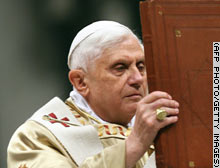A biased perspective... An attempt at reading the scritupres through a women's eyes - Women and ministry.
 Tuesday, April 24, 2007 at 7:53PM
Tuesday, April 24, 2007 at 7:53PM  I am seldom without an opinion... Or at least that's what Megie tells me! Ha ha.
I am seldom without an opinion... Or at least that's what Megie tells me! Ha ha.
Last week on Friday I combined my New Testament 2 class (with whom I am currently doing an introduction to the Pauline and pseudo-Pauline epistles and letters), and my Systematic Theology 1 class (with whom I am currently doing contextual theologies, such a liberation theology, feminist theology, and black theology).
We got together to study the topic of 'women in the ministry'. For those who are not familiar with the debate - two thirds of the Christians (that is Roman Catholic Christians) do not accept the ordination of women to presbuteral ministry i.e., they will not ordain women as priests. Moreover, for those who know anything about African culture, you will know that African men (particularly Xhosa and Zulu men) who hold to their ancient traditions are very patriarchal. This often means that women have a great deal to contend with when they enter the ministry in South Africa, not only do they have to face opposition from other Christian denominations, they also face cultural opposition.
So, here's what I did. I brought my two classes together. Just less than half of the students in these two classes are women. I then gave them an opportunity to prepare a debate on women in the ministry. However, I got the women to argue that women SHOULD NOT be allowed to be ordained, and the men to argue that WOMEN MUST be ordained to ministry. It was a lively and creative interaction!
Here is a little paper that I wrote to hand out to the students.
Women in Ministry 2007.doc (it is a small document in MS Word format).
It is an attempt at approaching the scriptures from a womanist perspective (in other words, I attempt to read the scriptures with the perspective of women who are called to ministry in mind).
Let me know what your thoughts are on the subject, and on the paper!
Blessings,
Dion




